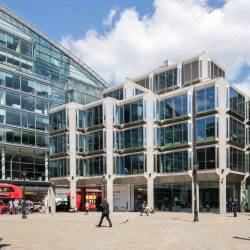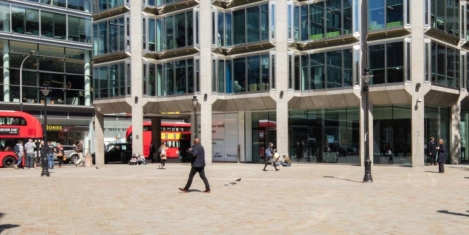To provide the best experiences, we use technologies like cookies to store and/or access device information. Consenting to these technologies will allow us to process data such as browsing behaviour or unique IDs on this site. Not consenting or withdrawing consent, may adversely affect certain features and functions.
The technical storage or access is strictly necessary for the legitimate purpose of enabling the use of a specific service explicitly requested by the subscriber or user, or for the sole purpose of carrying out the transmission of a communication over an electronic communications network.
The technical storage or access is necessary for the legitimate purpose of storing preferences that are not requested by the subscriber or user.
The technical storage or access that is used exclusively for statistical purposes.
The technical storage or access that is used exclusively for anonymous statistical purposes. Without a subpoena, voluntary compliance on the part of your Internet Service Provider, or additional records from a third party, information stored or retrieved for this purpose alone cannot usually be used to identify you.
The technical storage or access is required to create user profiles to send advertising, or to track the user on a website or across several websites for similar marketing purposes.
 Landsec has launched its new flexible office brand, Myo, which it claims will provide customised office space for businesses looking for flexibility to enable future growth from April of this year. Coworking in other words. The move is the latest example of a major commercial property firm entering the market for flexible offices and coworking space in the wake of its recent boom. Myo will operate as a standalone brand, offers flexible leases ranging from 12 months to three years for businesses that need space for between 15 and 80 people.
Landsec has launched its new flexible office brand, Myo, which it claims will provide customised office space for businesses looking for flexibility to enable future growth from April of this year. Coworking in other words. The move is the latest example of a major commercial property firm entering the market for flexible offices and coworking space in the wake of its recent boom. Myo will operate as a standalone brand, offers flexible leases ranging from 12 months to three years for businesses that need space for between 15 and 80 people.














 Half of employees say that their working environment has a negative effect on their mental health (51 percent) and wellbeing (49 percent) and two-thirds (67 percent) say that they only ‘sometimes, rarely or never’ feel valued at work. The research by Peldon Rose shows that two-thirds of employees (64 percent) currently have poor or below average mental wellbeing and that the majority (56 percent) claim increasing workloads, followed by a lack of time to focus on wellbeing and exercise (46 percent) are the leading causes of their stress. While half of employees think introducing exercise facilities will help them to better tackle their workplace stress (50 percent) – less than a fifth of workplaces (16 percent) currently provide these facilities, something employers should consider when looking to boost the morale of their workforce.
Half of employees say that their working environment has a negative effect on their mental health (51 percent) and wellbeing (49 percent) and two-thirds (67 percent) say that they only ‘sometimes, rarely or never’ feel valued at work. The research by Peldon Rose shows that two-thirds of employees (64 percent) currently have poor or below average mental wellbeing and that the majority (56 percent) claim increasing workloads, followed by a lack of time to focus on wellbeing and exercise (46 percent) are the leading causes of their stress. While half of employees think introducing exercise facilities will help them to better tackle their workplace stress (50 percent) – less than a fifth of workplaces (16 percent) currently provide these facilities, something employers should consider when looking to boost the morale of their workforce.


 New research has found that over 2 million UK workers think about quitting their job every day and this figure was significantly higher amongst younger workers, aged 18-24, with 12 percent of those surveyed stating they think about this daily. The research by CABA, a charity supporting the wellbeing of chartered accountants and their families, also highlighted that 38 percent of employees regularly encountered stressful situations at work. Women were most likely to feel this way, with 41 percent revealing they deal with stressful circumstances at least once a week. Comparatively, only 34 percent of male employees admitted to encountering such situations on at least a weekly basis. Many factors were cited as contributing to employees feeling stressed, including unrealistic expectations and unmanageable workloads. Regardless of how it manifests itself within the working environment it can have a negative impact on employee wellbeing, with over 1 in 10 (12 percent) missing at least 52 family events or personal commitments each year.
New research has found that over 2 million UK workers think about quitting their job every day and this figure was significantly higher amongst younger workers, aged 18-24, with 12 percent of those surveyed stating they think about this daily. The research by CABA, a charity supporting the wellbeing of chartered accountants and their families, also highlighted that 38 percent of employees regularly encountered stressful situations at work. Women were most likely to feel this way, with 41 percent revealing they deal with stressful circumstances at least once a week. Comparatively, only 34 percent of male employees admitted to encountering such situations on at least a weekly basis. Many factors were cited as contributing to employees feeling stressed, including unrealistic expectations and unmanageable workloads. Regardless of how it manifests itself within the working environment it can have a negative impact on employee wellbeing, with over 1 in 10 (12 percent) missing at least 52 family events or personal commitments each year.














January 22, 2019
A four hundred year old guide to ergonomics that still rings true today
by Mark Eltringham • Comment, Workplace design
(more…)